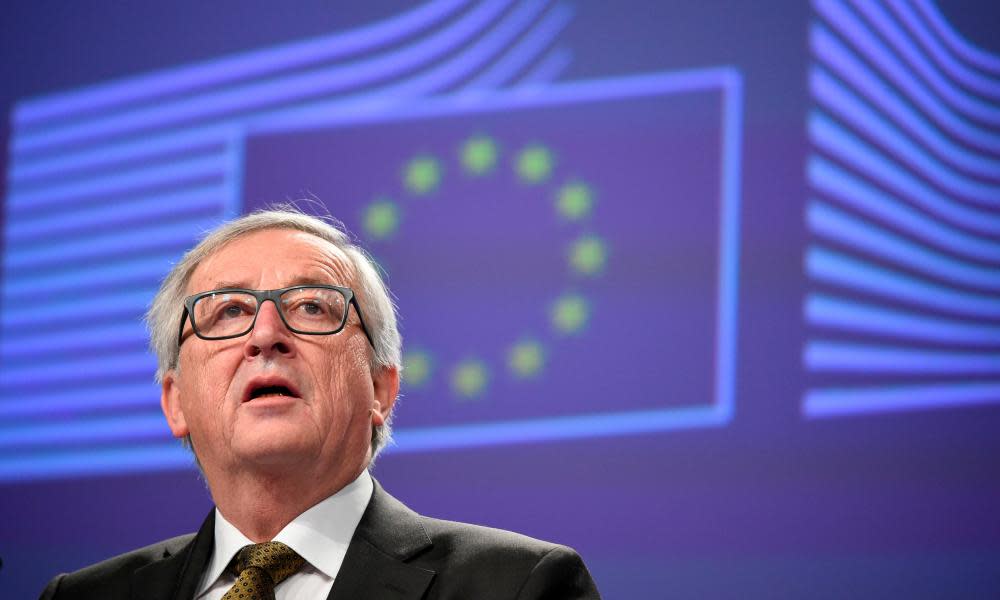Not who but how: EU split over choosing Juncker successor

It has been the talk of Brussels coffee bars for weeks, and now European leaders are gathering for a special summit to parse a troublesome question.
No, it isn’t Brexit. It is the EU’s next jobs merry-go-round, starting with how to choose a successor to the European commission president, Jean-Claude Juncker.
The question is not yet who will replace Juncker, but how. EU leaders – minus Britain’s Theresa May – are meeting in Brussels on Friday and are expected to fight back against attempts by the European parliament to lay down the rules for choosing the next commission president.
The two EU institutions are at odds over parliament’s push for a system that would tie the choice of commission president to the result of European elections.
The parliament won round one in 2014, by devising a system under which each of the large pan-European political parties chose a “lead candidate” or spitzenkandidat to head the commission. The candidate of the group that won the most seats would be propelled into the top job at the EU’s executive, which drafts and enforces EU laws.
The centre-right European People’s party (EPP) candidate, Jean-Claude Juncker, defeated his Socialist rival Martin Schulz in 2014 after the EPP emerged as the biggest party in that year’s elections.
EU leaders were presented with a fait accompli and felt compelled to accept Juncker despite widespread concern that he was the wrong man for the job. Only David Cameron and his Hungarian counterpart, Viktor Orbán, voted against him, as other EU leaders worried they would be perceived as anti-democratic if they were to choose their own candidate.
The European council president, Donald Tusk, does not want EU leaders to be outmanoeuvred by the parliament again. On Friday he will defend EU leaders’ right to choose Juncker’s successor as laid down in European treaties. “The European council cannot deprive itself of its prerogative to choose the person it proposes as president of the European commission without a change of the treaty,” he states in a letter to EU leaders.
The EU treaty states that EU leaders choose the European commission president “taking into account the elections to the European parliament”, but the parliament must give its consent.
Some senior EU diplomats think it is too late to reverse the spitzenkandidaten system, as any attempt to reject the lead candidate will be perceived as undemocratic. “The game is over,” said one senior diplomat, blaming EU leaders for not acting sooner in 2014. “They should have killed it then.” Others argue it is not too late for leaders to take charge of the process.
The parliament argues the spitzenkandidaten process makes the EU more democratic by connecting it to citizens. Opponents think European elections, where turnout averaged 42.6% in 2014, fail to energise voters and see the process as a classic stitch-up between big groups.
One of the biggest losers from the parliament’s preferred system would be the French president, Emmanuel Macron, who aspires to create a European equivalent to his En Marche! movement. He would struggle to break the stranglehold of the traditional parties if the spitzenkandidaten prevails.
Macron, who is yet to affiliate with any of the pan-European political groups, also faced a setback in his ambition to create MEPs representing Europe when the European parliament itself rejected the idea earlier this month. MEPs voted down plans to use some of the 73 seats vacated by the departing British members to create transnational lists.
EU leaders will also hold their first discussion on the EU’s next long-term budget, as they look to fill the €14bn black hole created by the UK’s departure. The next budget could be the most complex EU negotiation over money that has ever been undertaken in Brussels.
Countries must reconcile the loss of British funds with ambitions to preserve traditional spending on farming and regional aid,and increase spending on migration and defence.
Also on the table are numerous ideas to make EU funds conditional on good behaviour, from respecting migration quotas to adhering to the rule or law. EU leaders will not, however, get into the technical weeds on Friday, ahead of a formal proposal from the commission in May.

 Yahoo News
Yahoo News 
